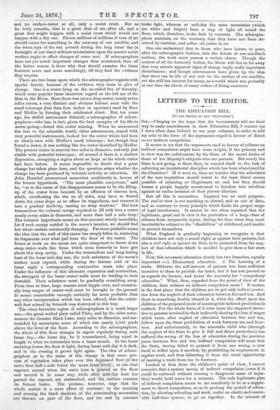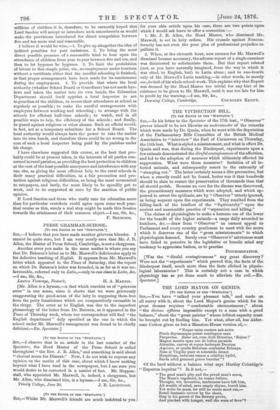LETTERS TO THE EDITOR.
THE EDUCATION BILL
[TO THE EDITOR OF TEM SPBOTAT011.1 SIR,—Clinging to the hope that the Government will see their way to make amendments in their Education Bill, I venture (as I have often done before) to use your columns, in order to add- my mite to the force of the arguments urged in favour of direct versus indirect compulsion.
It seems to me that the arguments used in favour of reliance on indirect compulsion might have some weight, if the primary end in view was the enforcement by the State of the moral duties of those of her Majesty's subjects who are parents. But surely the State is not going, in these days, to commit itself to the task of enforcing an inquisitorial discipline which has been abandoned by the Churches? If it were so, then no wonder that the advocates of the new inquisition should resort to the least direct meaner possible of attaining so illegitimate an end, lest they should harass a people happily accustomed to freedom into rebellion against an undue invasion of their private liberties.
But all this is moonshine. England has no such purpose. The end in view is not anything so absurd, and so out of date, and so contrary to every principle which limits the proper range of legal interference. It cannot be too often repeated that the legitimate, great end in view is the protection of a large class of citizens from irreparable injury, during the time when they must inevitably be subject to the " disabilities " of childhood, and unable to protect themselves.
What England is gradually beginning to recognise is that children have not only a moral right, as against their parents, but also a civil right, as against the State, to be protected from the neg- lect of that education which is needful to give them a fair start in life.
Now, this necessary education clearly has two branches, equally important :-1. Elementary education. 2. The learning of a trade. Hitherto the self-interest of parents has been sufficient incentive to them to provide the latter, but it has not proved so as regards the former, and hence the necessity for "compulsory education." What, then, regarded from the point of view of the children, does reliance on indirect compulsion mean ? It means, in the first place, that the children are to get only indirect protec- tion from the neglect of their education between five and ten. And there is something doubly absurd in it, when the effect upon the children of the proposed mode of insuring this indirect protection is realised. For the whole force of it rests upon the supposed incen- tive to parents involved in their indirectly sharing the loss of wages which must, after neglect of education between five and ten, follow upon the State prohibition of work between ten and four- teen. And unfortunately, to the miserable child who (through the neglect of the State to give it full and direct protection) has suffered the wrong of the loss of education during the precious years between five and ten, indirect compulsion will mean that the State, having failed to protect it from one wrong, is now itself to inflict upon it another, by prohibiting its employment in regular work, and thus debarring it from the usual opportunity of learning a trade from ten to fourteen.
Looked at thus from the children's point of view, I cannot conceive that a system merely of indirect compulsion (even if it could be enforced without rousing a dangerous sense of injus- tice) would hold water for a moment. The only legitimate plan of indirect compulsion seems to me manifestly to be as a supple- ment to direct compulsion, so as to prolong the period of educa- tion, by allowing schooling and work, under an elastic and reason- able half-time system, to go on together. In the interest of millions of children it is, therefore, to be earnestly hoped that Lord Sandon will accept or introduce such amendments as would make the provisions introduced for direct compulsion between five and ten more real and reasonable.
I believe it would be wise,-1. To give up altogether the idea of indirect penalties for past omissions. 2. To bring the most direct possible pressure of a reasonable kind to bear upon the
attendance of children from year to year between five and ten, and then to let bygones be bygones. 3. To limit the prohibition of labour to this simple point, viz., no employment under fourteen without a certificate either that the needful schooling is finished, or that proper arrangements have been made for its continuance during the employment. 4. To provide that where the local authority (whether School Board or Guardians) has not made bye- laws and taken the matter into its own hands, the Education Department should itself appoint a local inspector to act as guardian of the children, to secure their attendance at school as regularly as possible ; to make the needful arrangements with employers between working and schooling ; to arrange with the schools for efficient half-time schools ; to watch, and in all possible ways to help, the efficiency of the schools ; and finally, to guard against religious or other abuses. Such an official would, in fact, act as a temporary substitute for a School Board. The local authority would always have the power to take the matter into its own hands, and therefore there could be no wrong in the cost of such a local inspector being paid by the parishes under his charge.
I have elsewhere suggested this course, as the best that pro- bably could be at present taken, in the interests of all parties con- cerned in rural parishes, as providing the best protection to children at the cost of the least possible annoyance and interference with any one else, as giving the most efficient help to the rural schools in their many practical difficulties, as a fair precaution and pro- tection against religious difficulties, as being the most economical to ratepayers, and lastly, the most likely to be speedily got to work, and to be supported at once by the sanction of public opinion.
If Lord Sandon and those who really care for education more than for particular crotchets could agree upon some such prac- tical course as this, surely a real step might be made this Session towards the attainment of their common object.—I am, Sir, &c., F. SEEBOHM.

































 Previous page
Previous page